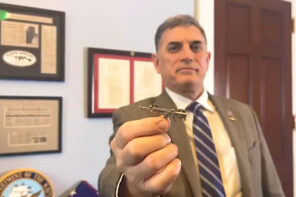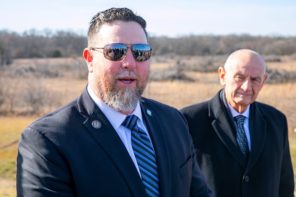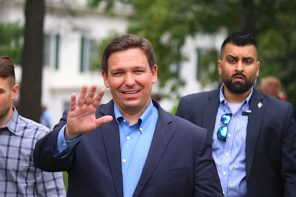A little more than a week after the Democrats’ predicted and predictable loss of the House, the Obama Administration is signaling that it will cave to conservative pressure and accept a continuation of the Bush tax cuts—even for those making over $250,000 per year.
“We have to deal with the world as we find it,” said Obama’s top adviser, David Axelrod, explaining that given GOP control of the House there would be no way to maintain the tax cuts for the middle-class without keeping those for the wealthiest. To mark this latest capitulation framed as a compromise, a letter to the Washingtonians…
To the moderate political classes, religious leaders, and activists who are tempted after the Republican gains in the 2010 midterms to call for more compromise, civility, and government sensitivity to the plight of “the least of these”:
Late in the year 2000, I stayed up late into the night watching election returns. The hope for a Gore presidency went down hard, like sparks struck from a flint. At 2:30 in the morning, the light came down to Florida. I went to bed, confident that we would have a new president when I awoke.
In 2001, that new president’s administration had barely begun when the World Trade Center collapsed, the Pentagon burned, a plane evaporated into the hills not too far from where we lived. A strangely quiet day grew quieter. One of my parishioners broke a lunch date, explaining that her bank’s financial data was routed through the Trade Center. “The printers are spitting out page after page of garbage,” she said before she rushed back to the office. I met a young Marine in the back of the coffee shop, nodded to him, knowing he would soon be at war. Traffic stopped, there were no planes in the sky, the phone didn’t ring.
I supported the war to come, with only the reservation of who held the keys of command. Still, the enemies of the good must be punished, must be denied the safety of even a parched rocky hillside in a poor land.
In 2002 and 2003, the grim infection of another war became more and more certain. I did not support this war. It was wrong, and I said so from my pulpit.
I paid the price: enraged members of the congregation were certain that I had dishonored the troops, that President Bush was the hand appointed by God to lead the nation to safety, that no Christian could oppose this war to protect our civilization.
Days after the first troops poured across the border into Iraq, my son was born, though I did not know him at the time. His mother, poor, ill, and struggling with drugs and booze, lost him and his sister to the county some time later. I doubt very much that as she sank into the arms of addiction that she took notice of one election after another, of one economic setback after another, of torture and Katrina and corruption and the undermining of civil liberties.
I am sure that she had no idea that Democrat after Democrat was reviled as weak on terror; that John Kerry was made out to be a traitor; that Republicans scoffed at the notion of the rich paying taxes, and encouraged the nation to go shopping to restore the economy. How could she? Why would she? These were all far-off matters, not the sort of thing that would affect the streets on which she lived.
In 2006, the nation seemed to be turning a corner. Responsible governance came back to at least some corners. The Bush presidency began its long retreat from the nation and the consequences were tragic. New Orleans was not rebuilt, the housing bubble heaved and sighed and collapsed without intervention or consequence to the fraudulent or those who bought and sold lives in mathematical equations without faces. But the spirit was gone; Rove was in disgrace, Cheney was reduced to playing the snarling bogeyman on occasion. Nothing new happened, thanks be to God.
And in 2008, I, like so many others, dared to hope. Not in some supposed new Chosen One—that Obama was some messianic figure was an idea rooted only in the firm soil of authoritarian minds opposed to his election—but we hoped that what had been stored up in the rejection of all that came before that fall might be used to seed a new time in our history.
I hoped that my nation might be headed in a new direction.
I hoped that my people might be more generous and open.
I hoped that the wars might finally come to an end.
I hoped that the government might rule fairly, for all.
What have we received instead?
A week after the election, we find that those who laugh at the idea of justice are returned to power.
Those who scorn the common work, who mock the very idea of community even as they receive its benefits, drive our politics.
My son has never known a nation that was not at war.
He has never known a nation where jobs for the many outweighed wealth for the few, where health for the struggling outweighed profits for the faceless multinationals, where banks were not entitled to eat before the working; never known a nation where anyone even stopped to think about the inner city, where the poor did not have to beg for food, a nation with more purpose to it than war to protect a Christendom that looks suspiciously like empire and brooks no dissension or difference.
My son and daughter—we all—live in an America that is perilously close to all against all, where only the strong and the well-connected can look ahead with some measure of security. Those who cannot—the young, the sick, the victims of layoffs and mergers and jobs leaving the nation—lose their houses, their savings, their opportunities, their futures. We drown in a sea of personal debt, live in fear of an accident or an expensive illness, despair of being able to find a steady job or retiring, let alone lift our neighbors out of their plight.
The people are crying out, yet they are not heard by you, the moderate political classes, religious leaders and activists eager for more compromise.
You have preached civility while media leaders suborned violence to advance their partisan positions, drooled over the phantom middle, begging and pleading and whining for peaceable politics while, on count after count, our irrational, uncompromising, hateful, and corrupt (but smiling) leaders ground the people down.
You have ignored or failed to understand how our political system is designed to exclude the ordinary people, and instead you have asked ever so politely for the government to give you a few more scraps for the poor, please, if it can be at all afforded.
You have sold out women for a phony compromise on abortion to pass a watered-down bill, said “not now” to those who love members of their own gender, counseled patience when people are starving, been prudent when they are cheated out of their homes, been mindful of upsetting the banks and the deficit hawks when they needed investment in the economy to work.
You have done nothing to end the war in Iraq, nothing to end the war in Afghanistan.
And now that you have reaped what you have sown, you call for more compromise.
Because you have failed to take the side of ordinary people—those who live from paycheck to paycheck without security, with precious little hope in their lives—they have turned their backs on you. They have made common cause with those who oppress them, who mean to turn you out of office, to turn back the clock, and undo every good that you have done.
And you still don’t get it.
A word needs to be said here; that is to say, a word imagining the world differently, based on what we know and claim of God. That word, in brief, is that change—real, meaningful change, the kind God calls for—does not arise from easy reconciliation, nor again from charity, but from redemption, the purchasing back at great cost the lives and futures of the people of God.
I do hope that you will stay tuned. Our children deserve a better inheritance than the one they have been given.




